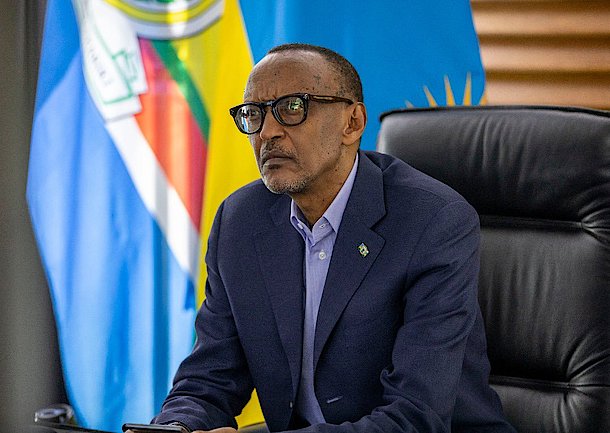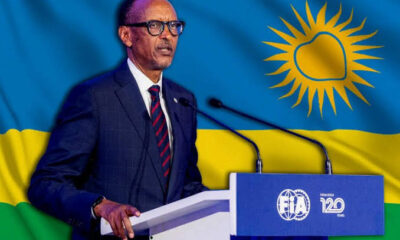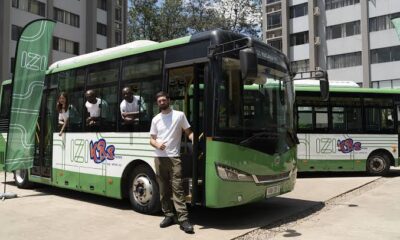Strictly Personal
Kagame of Rwanda is repeating the same African leadership mistake, By Azuka Onwuka
Published
5 months agoon

Last week, Paul Kagame of Rwanda was sworn in for his fourth term in office, thereby adding another five years to the 24 he has spent. By the time this new term is over in 2029, he will have officially governed Rwanda for 29 years without taking into consideration the unofficial six years he was in charge of Rwanda.
As the former rebel commander of the Rwandan Patriotic Front, whose forces swept to power in 1994, Kagame was the vice president and minister of defence of Rwanda between 1994 and 2000. However, he was seen as the de facto president because he wielded more power than the de jure president, Pasteur Bizimungu, who eventually resigned, with Kagame taking over. It is alleged that Bizimungu was forced to resign. In 2001, Bizimungu founded the Party for Democratic Renewal, but Kagame’s new government immediately proscribed it. Bizimungu was subsequently tried and handed a 15-year jail term for attempting to form a militia, inciting violence, and corruption, but was pardoned three years later by Kagame.
Therefore, if those six years of Kagame as the de facto leader of the country are added to the 24 years he has governed Rwanda, that will be 30 years in power, with another five years secured this year.
Another interesting point about Kagame’s victory in the July 15 Rwandan election was that he won with over 99.18 per cent of the vote cast, thereby beating his own past records. Kagame, who will be 67 in October, set a record when he won the 2017 election with 98.63 per cent of the vote. In 2010, he won with 93 per cent, while in 2003, he secured 95 per cent.
Rwanda’s National Electoral Commission, which said that voter turnout was a staggering 98 per cent, had disqualified some presidential aspirants, including Kagame’s fiercest critics, from participating in the election. It allowed two candidates to contest against him. While the Democratic Green Party’s candidate, Frank Habineza, scored 0.53 per cent, Philippe Mpayimana, who ran as an independent candidate, got 0.32 per cent of the vote.
Kagame has been one of the best presidents Africa has produced in the 21st century. He has brought stability and progress to Rwanda, turning it from the land of obscurity and genocide to a preferred tourist centre in Africa. The country has always featured among the fastest-growing economies, not just in Africa but in the world. Its capital Kigali is also called the cleanest city in Africa.
Under the leadership of Kagame, Rwanda has also consistently held the record of the country with the highest percentage of female representation in parliament. The percentage of women in the Rwandan parliament is usually above 60. In 2023, while Rwanda had 61.25 per cent female legislators, only two other countries had more women than men in the legislature: Nicaragua (51.65 per cent) and New Zealand (50.42 per cent).
However, Kagame’s critics accuse him of suppressing all forms of opposition and dissent. Kagame is accused of having an image of a champion of democracy and good governance abroad, which conflicts with the dictatorial image he has at home.
This does not faze those who have the view that third-world countries need “benevolent dictators” to speedily transform them and catch up with the developed countries. They cite countries like Singapore, the United Arab Emirates, and China as examples. They argue that developing countries have weak institutions that cannot take independent steps that can transform countries.
But despite Kagame’s achievements, it seems history may repeat itself in Rwanda. It’s most unlikely Kagame will ever want to live in Rwanda as an ex-president. Therefore, Kagame may want to cling to power and be a life president.
Muammar Gaddafi of Libya was a great leader to Libyans but he did not end well because he stayed too long in power. Robert Mugabe led the Zimbabwean independence in 1980, making Bob Marley to sing a song for the country titled “Zimbabwe”, but Mugabe did not end well because he stayed too long in power.
For anybody who truly wants to create some milestones while holding a political post, especially that of the president of a country, about 10 years is enough for that. That Kagame has not been able to find a successor after over two decades points to a problem.
Some could argue that Kagame is building “a solid foundation” for Rwanda. They could point at Singapore where Lee Kuan Yew governed as prime minister from 1959 to 1990 (31 years). But the lure of power is dangerous. The moment political leaders see themselves as the only people who can govern a country successfully, it blunts their sense of judgement. They equate themselves unknowingly with the state. They start to see their desires as the desires of the country. Anybody who opposes them becomes an enemy and a saboteur that must be taken out. The only people they trust become those who praise them and tell them only what they want to hear.
Kagame has done well for Rwanda. One wishes that there were more African leaders with his type of vision and commitment to development. It is surprising that it is the same Rwanda that had gory scenes of genocide in 1994 that one sees these days. He discovered that ethnic loyalty is perhaps the biggest problem most African countries face, which creates perennial crises and stunts their growth.
Therefore, he took decisive legislative steps to eliminate ethnic identification. In 2001, laws against ethnic divisionism and discrimination were passed and are enshrined in the 2003 constitution. The penalty for breaching these laws includes long prison terms and heavy fines. The Rwandan state promotes the ideology of ndi umunyarwanda (“I am Rwandan”) or Rwandan nationality as the only welcome identity. Rwandans now see themselves as Rwandans and not as Hutu or Tutsi or Twa. Rwandans are now taught that Hutu, Tutsi, and Twa ethnic identification was a divisive mechanism imposed by Belgian colonials who wanted to make their rule more successful.
It is now considered rude and divisive for even a visitor to ask Rwandans about their ethnic groups. The idea behind this is to make it easier for Rwandans to build a nation in which they see one another as compatriots and judge people based on the strength of their character rather than their ethnicity, which was what led to the 1994 genocide and the decades of backwardness and strife that preceded the genocide.
Some people may argue that ethnic identity should not be suppressed with legislation, but that patriotism should be taught and allowed to naturally take root. However, there are some subtle parallels in developed countries. In most Western countries, it is against the law to ask someone: “Where are you from?” It is also against the law to ask people their gender, age, race, marital status, and the like during processes like recruitment. These are seen as discriminatory tools. Those who have been asked such questions can sue those who asked the questions.
But despite the achievements recorded by Kagame, there is a need for him to think about what Rwanda will be without him. Does he ask himself what will happen to Rwanda if he suddenly has a fatal heart attack or plane crash? Has he built a country that can survive and continue to run seamlessly without him? Even if he does not believe in allowing democracy to choose a successor, why has he not groomed someone in the 30 years he has been in power to succeed him?
It is dangerous to hang the fate of a country of 14 million on one human being. It will be heartbreaking for the progress made by Rwanda to be reversed by an unforeseen circumstance or an uprising caused by discontent. No matter how good a leader is, the followers will one day become weary of seeing the same face for decades. Africa needs to start creating several examples of true democracies.
–X: @BrandAzuka
You may like
-


M23 Angola peace talks break down as Congo, Rwanda dash hopes
-


IMF’s latest board reviews result in $182 million to Rwanda
-


Rwanda makes bid for Formula 1 to return to Africa
-


For swearing during news conference, Verstappen to do ‘public interest’ work in Rwanda
-


Kenyan fintech Chumz expands into Rwanda after hitting 200k users
-


Rwanda’s e-mobiility startup IZI expands electric bus fleet after getting grant from Green Fund
Strictly Personal
Let’s merge EAC and Igad, By Nuur Mohamud Sheekh
Published
2 months agoon
November 27, 2024
In an era of political and economic uncertainty, global crises and diminishing donor contributions, Africa’s regional economic communities (RECs) must reimagine their approach to regional integration.
The East African Community (EAC) and the Intergovernmental Authority on Development (Igad), two critical RECs in East Africa and the Horn of Africa have an unprecedented opportunity to join forces, leveraging their respective strengths to drive sustainable peace and development and advance regional economic integration and promote the African Continental Free Trade Area (AfCFTA).
Already, four of the eight Igad member states are also members of the EAC and, with Ethiopia and Sudan showing interest, the new unified bloc would be formidable.
Igad’s strength lies in regional peacemaking, preventive diplomacy, security, and resilience, especially in a region plagued by protracted conflicts, climate challenges, and humanitarian crises. The EAC, on the other hand, has made remarkable strides in economic integration, exemplified by its Customs Union, Common Market, and ongoing efforts toward a monetary union. Combining these comparative advantages would create a formidable entity capable of addressing complex challenges holistically.
Imagine a REC that pairs Igad’s conflict resolution strengths with the EAC’s diplomatic standing and robust economic framework. Member states of both are also contributing troops to peacekeeping missions. Such a fusion would streamline efforts to create a peaceful and economically prosperous region, addressing the root causes of instability while simultaneously promoting trade investment and regional cooperation.
These strengths will be harnessed to deal with inter-state tensions that we are currently witnessing, including between Ethiopia and Somalia over the Somaliland MoU, strained relations between Djibouti and Eritrea, and the continually deteriorating relations between Eritrea and Ethiopia.
The global economy experienced as a result of the COVID-19 pandemic, compounded by the Ukraine war and competing global crises, has strained donor countries and reduced financial contributions to multilateral organisations and African RECs. Member states, many of which are grappling with fiscal constraints, are increasingly unable to fill this gap, failing to make timely contributions, which is in turn affecting key mandate areas of Igad and EAC, and staff morale.
A merger between Igad and EAC would alleviate this financial pressure by eliminating redundancies. Shared administrative systems, integrated programmes, and a unified leadership structure would optimise resources, enabling the new REC to achieve more with less. Staff rationalisation, while sensitive, is a necessary step to ensure that limited funds are channelled toward impactful initiatives rather than duplicative overheads.
The African Union (AU) envisions a fully integrated Africa, with RECs serving as the building blocks of the AfCFTA. A unified EAC-Igad entity would become a powerhouse for regional integration, unlocking economies of scale and harmonising policies across a wider geographical and economic landscape.
This merger would enhance the implementation of the AfCFTA by creating a larger, more cohesive market that attracts investment, fosters innovation, and increases competitiveness. By aligning trade policies, infrastructure projects, and regulatory frameworks, the new REC could serve as a model for others, accelerating continental integration.
The road to integration is not without obstacles. Political will, divergent institutional mandates, and the complexity of harmonising systems pose significant challenges. However, these hurdles are surmountable through inclusive dialogue, strong leadership, and a phased approach to integration.
Member states must prioritise the long-term benefits of unity over short-term political considerations. Civil society, the private sector, the youth, and international partners also have a critical role to play in advocating for and supporting this transformative initiative.
The time for EAC and Igad to join forces is now. By merging into a single REC, they would pool their strengths, optimise resources, and position themselves as a driving force for regional and continental integration. In doing so, they would not only secure a prosperous future for their citizens and member states but also advance the broader vision of an integrated and thriving Africa.
As the world grapples with crises, Africa must look inward, embracing the power of unity to achieve its potential. A combined Igad-EAC is the bold step forward that the continent needs.
Nuur Mohamud Sheekh, a diplomatic and geopolitical analyst based in London, is a former spokesperson of the Igad Executive Secretary. X: @NuursViews
Strictly Personal
Budgets, budgeting and budget financing, By Sheriffdeen A. Tella, Ph.D.
Published
2 months agoon
November 20, 2024
The budget season is here again. It is an institutional and desirable annual ritual. Revenue collection and spending at the federal, State and local government levels must be authorised and guided by law. That is what budget is all about. A document containing the estimates of projected revenues from identified sources and the proposed expenditure for different sectors in the appropriate level of government. The last two weeks have seen the delivery of budget drafts to various Houses of Assembly and the promise that the federal government would present its draft budget to the National Assembly.
Do people still look forward to the budget presentation and the contents therein? I am not sure. Citizens have realised that these days, governments often spend money without reference to the approved budget. A governor can just wake up and direct that a police station be built in a location. With no allocation in the budget, the station will be completed in three months. The President can direct from his bathroom that 72 trailers of maize be distributed to the 36 states as palliatives. No budget provision, and no discussion by relevant committee or group.
We still operate with the military mentality. We operated too long under the military and of the five Presidents we have in this democracy, two of them were retired military Heads of State. Between them, they spent 16 years of 25 years of democratic governance. Hopefully, we are done with them physically but not mentally. Most present governors grew up largely under military regimes with the command system. That is why some see themselves as emperor and act accordingly. Their direct staff and commissioners are “Yes” men and women. There is need for disorientation.
The importance of budget in the art of governance cannot be overemphasized. It is one of the major functions of the legislature because without the consideration and authorisation of spending of funds by this arm of government, the executive has no power to start spending money. There is what we refer to as a budget cycle or stages. The budget drafting stage within the purview of the executive arm is the first stage and, followed by the authorisation stage where the legislature discusses, evaluates and tinkers with the draft for approval before presenting it to the President for his signature.
Thereafter, the budget enters the execution phase or cycle where programmes and projects are executed by the executive arm with the legislature carrying out oversight functions. Finally, we enter the auditing phase when the federal and State Auditors verify and report on the execution of the budgets. The report would normally be submitted to the Legislature. Many Auditor Generals have fallen victim at this stage for daring to query the executives on some aspects of the execution in their reports.
A new budget should contain the objectives and achievements of the preceding budget in the introduction as the foundation for the budget. More appropriately, a current budget derives its strength from a medium-term framework which also derives its strength from a national Development Plan or a State Plan. An approved National Plan does not exist currently, although the Plan launched by the Muhammadu Buhari administration is in the cooler. President Tinubu, who is acclaimed to be the architect of the Lagos State long-term Plan seems curiously, disillusioned with a national Plan.
Some States like Oyo and Kaduna, have long-term Plans that serve as the source of their annual budgets. Economists and policymakers see development plans as instruments of salvation for developing countries. Mike Obadan, the former Director General of the moribund Nigeria Centre for Economic and Management Administration, opined that a Plan in a developing country serves as an instrument to eradicate poverty, achieve high rates of economic growth and promote economic and social development.
The Nigerian development plans were on course until the adoption of the World Bank/IMF-inspired Structural Adjustment Programme in 1986 when the country and others that adopted the programme were forced to abandon such plan for short-term stabilisation policies in the name of a rolling plan. We have been rolling in the mud since that time. One is not surprised that the Tinubu administration is not looking at the Buhari Development Plan since the government is World Bank/IMF compliant. It was in the news last week that our President is an American asset and by extension, Nigeria’s policies must be defined by America which controls the Bretton Woods institutions.
A national Plan allows the citizens to monitor quantitatively, the projects and programmes being executed or to be executed by the government through the budgeting procedure. It is part of the definitive measures of transparency and accountability which most Nigerian governments do not cherish. So, you cannot pin your government down to anything.
Budgets these days hardly contain budget performance in terms of revenue, expenditure and other achievements like several schools, hospitals, small-scale enterprises, etc, that the government got involved in successfully and partially. These are the foundation for a new budget like items brought forward in accounting documents. The new budget should state the new reforms or transformations that would be taking place. Reforms like shifting from dominance of recurrent expenditure to capital expenditure; moving from the provision of basic needs programmes to industrialisation, and from reliance on foreign loans to dependence on domestic fund mobilisation for executing the budget.
That brings us to the issue of budget deficit and borrowing. When an economy is in recession, expansionary fiscal policy is recommended. That is, the government will need to spend more than it receives to pump prime the economy. If this is taken, Nigeria has always had a deficit budget, implying that we are always in economic recession. The fact is that even when we had a surplus in our balance of payment that made it possible to pay off our debts, we still had a deficit budget. We are so used to borrowing at the national level that stopping it will look like the collapse of the Nigerian state. The States have also followed the trend. Ordinarily, since States are largely dependent on the federal government for funds, they should promote balanced budget.
The States are like a schoolboy who depends on his parents for school fees and feeding allowance but goes about borrowing from classmates. Definitely, it is the parents that will surely pay the debt. The debt forgiveness mentality plays a major role in the process. Having enjoyed debt forgiveness in the past, the federal government is always in the credit market and does not caution the State governments in participating in the market. Our Presidents don’t feel ashamed when they are begging for debt forgiveness in international forum where issues on global development are being discussed. Not less than twice I have watched the countenance of some Presidents, even from Africa, while they looked at our president with disdain when issues of debt forgiveness for African countries was raised.
In most cases, the government, both at the federal and state cannot show the product of loans, except those lent by institutions like the World Bank or African Development Bank for specific projects which are monitored by the lending institutions. In other cases, the loans are stolen and transferred abroad while we are paying the loans. In some other cases, the loans are diverted to projects other than what the proposal stated. There was a case of loans obtained based on establishing an international car park in the border of the State but diverted to finance the election of a politician in the State. The politician eventually lost the election but the citizens of the State have to be taxed to pay the loan. Somebody as “Nigeria we hail thee”.
Transformation in budgeting should commence subsequently at the State and federal level. Now that local government will enjoy some financial autonomy and therefore budgeting process, they should be legally barred from contracting foreign loans. They have no business participating in the market. They should promote balanced budget where proposed expenditures must equal the expected revenues from federal and internal sources. The State government that cannot mobilise, from records, up to 40 percent of its total budget from IGR should not be supported to contract foreign loans. The States should engage in a balanced budget. The federal government budget should shift away from huge allocations to recurrent expenditure towards capital expenditure for capital formation and within the context of a welfarist state.
Sheriffdeen A. Tella, Ph.D.
EDITOR’S PICK


Nigeria: Marketers predict further price cut as another refinery begins operations
Oil marketers and the Nigerian Midstream and Downstream Petroleum Regulatory Authority expect refined petroleum product prices to reduce as another...


Kenya: Consumer inflation rises to 3.0% from 2.8%
Kenya’s statistics agency said on Tuesday that Kenya’s consumer price inflation increased slightly to 3.0% year-over-year in December from 2.8%...


South Africa’s Transnet’s half-year deficit hits $117m
Transnet, a state-owned logistics company in South Africa, announced on Tuesday that it had lost 2.2 billion rand ($117.48 million)...


Nigeria, China extend $2bn currency swap deal
A 15 billion yuan ($2 billion) currency-swap arrangement between China and Nigeria has been extended to boost investment and commerce...


Egypt’s central bank maintains overnight rates
As anticipated, Egypt’s central bank has maintained its overnight interest rates, stating that although inflation was predicted to drop significantly...


Illicit flows cost Nigeria, others $1.6bn daily— AfDB
According to the African Development Bank (AfDB), illicit money flows and profit shifting by multinational corporations doing business in Africa...


‘Don’t start what you can’t finish’, ex-Nigerian official replies President Tchiani
Former Nigerian Aviation Minister, Femi Fani-Kayode, has told President Abdourahamane Tchiani of Niger Republic to refrain from making infantile and...


Again, Starlink raises prices of its services in Nigeria
Elon Musk’s satellite internet service provider, Starlink, has again jacked up the prices of its services in Nigeria after an...


Former President of Moroccan club Raja sentenced to 3 years in prison
The former President of Moroccan top club, Raja Casablanca, Mohamed Aouzal, has been sentenced to three and a half years...


Zambia announces second case of Mpox as country battles cholera outbreak
The Zambian Ministry of Health has reported a second case of Monkeypox, popularly known as Mpox, in Kitwe region of...


